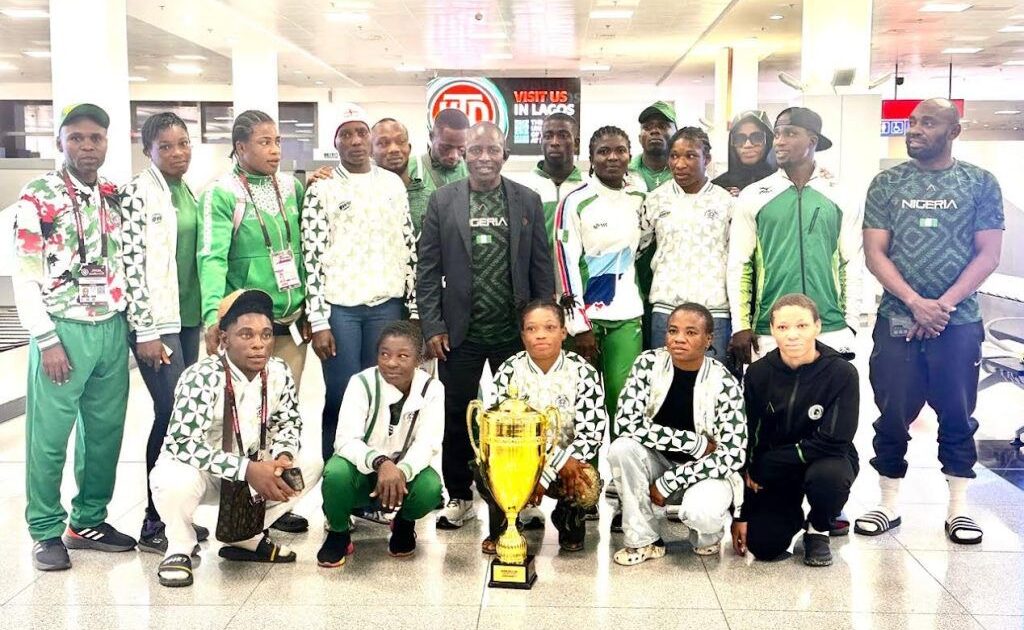The 40th African Wrestling Championships, held in Casablanca, Morocco, witnessed a compelling display of athleticism and sportsmanship, culminating in Nigeria’s impressive second-place finish in the overall medal standings. Trailing only Egypt, the Nigerian team showcased their prowess on the mat, securing a commendable total of 12 medals: 10 gold, one silver, and one bronze. This achievement underscores the growing strength of Nigerian wrestling on the continental stage, particularly within the women’s freestyle category. While Egypt claimed the overall top spot with a total of 24 medals (11 gold, eight silver, and five bronze), Nigeria’s focused performance highlighted specific areas of dominance and offered valuable insights into areas for future development.
The Nigerian women’s wrestling team emerged as the true stars of the championships, asserting their dominance in the freestyle category with a near-perfect sweep of the gold medals. Out of the ten gold medals available in this category, Nigeria’s female wrestlers captured nine, leaving only one to Algeria’s Chaimaa Aouissi in the 57kg weight class. This exceptional performance signifies the depth of talent and the dedication to training within the Nigerian women’s wrestling program. The gold medalists, including Mercy Genesis (50kg), Christianah Ogunsanya (53kg), Adijat Idris (55kg), Jumoke Adekoye (59kg), Esther Kolawole (62kg), Ebipatei Mughenbofa (65kg), Hannah Rueben (68kg), Ebi Biogos (72kg), and Damola Ojo (76kg), each contributed to this historic achievement, solidifying Nigeria’s position as a force to be reckoned with in African women’s wrestling.
In the men’s freestyle category, Nigeria’s Stephen Izolo secured the country’s sole gold medal in the 65kg weight class, overcoming tough competition from Tunisia’s Farouk Jelassi in the final. Izolo’s victory, complemented by bronze medals won by Said Ibrahim Elgahsh of Egypt and Wotna Cana Ndoc of Guinea-Bissau in the same category, showcased the competitiveness and diverse talent pool within African men’s wrestling. While Nigeria’s men’s team did not achieve the same level of dominance as their female counterparts, Izolo’s gold medal performance provided a bright spot and demonstrated the potential for future growth and success in the men’s division.
Beyond Izolo’s gold, Nigerian wrestlers also secured medals in other weight classes, contributing to the overall medal tally. Tope Adebayo earned a bronze medal in the men’s 70kg freestyle, showcasing resilience despite facing strong opponents in Tunisia’s Khairiddine Ben Tlili and Egypt’s Mohamed Elsayed Ahmed. Ebikeme Newlife added a silver medal to Nigeria’s collection in the 92kg class, finishing second to Cameroon’s Cédric Abossolo. These performances, while not culminating in gold, underscore the overall strength and competitive spirit of the Nigerian wrestling contingent, highlighting the potential for future development across different weight categories.
The 40th African Wrestling Championships also included age-grade competitions for junior (U-20) and cadet (U-17) wrestlers, offering a platform for emerging talent to showcase their skills and gain valuable experience on the international stage. However, Nigeria did not participate in these age-grade categories, focusing their efforts on the senior competition. While this decision may have been strategic, it also represents a missed opportunity to assess and nurture the next generation of Nigerian wrestlers. Participation in these youth categories is crucial for long-term development and sustained success in international wrestling, providing a crucial pathway for identifying and developing future champions.
In conclusion, Nigeria’s performance at the 40th African Wrestling Championships can be characterized as a resounding success, highlighted by the near-total dominance of the women’s freestyle team. The nine gold medals won by the female wrestlers signifies a milestone achievement for Nigerian wrestling and underscores the effectiveness of the training and development programs in place. While the men’s team secured fewer medals, Stephen Izolo’s gold medal performance provided a beacon of hope and demonstrated the potential for future growth. Looking ahead, Nigeria’s wrestling federation should prioritize participation in age-grade competitions to ensure a continuous pipeline of talent and maintain a competitive edge in future international tournaments. The success in Casablanca provides a strong foundation upon which to build, and with continued investment and strategic development, Nigerian wrestling is poised for even greater achievements on the global stage.














